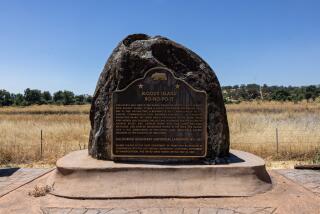Fort Sill Apache tribe says its roots are in New Mexico

AKELA FLATS, N.M. — Each year, Emily Haozous joins other Fort Sill Apache tribal members in a mountain spirit dance in Oklahoma.
But the spirits they pay tribute to and invoke for power and protection belong to a mountain more than 600 miles to the west, in the tribe’s ancestral homeland in southwestern New Mexico.
More than a century ago, Apaches with lineage to Geronimo were driven from New Mexico and taken as prisoners of war before eventually being released in Oklahoma. Now, the tribe’s 700-plus members want to return to the yucca-speckled desert town of Akela Flats.
“I feel like New Mexico is our home,” Haozous said. “I feel like the dirt is part of who I am.”
But a battle still lies ahead.
In 2011, the federal government designated a 30-acre parcel the tribe bought in Akela Flats as its lone reservation. The state’s officials did not go along, however, accusing the tribe of trying to capitalize on the gaming market in New Mexico.
Last month, the Fort Sill Apache sued Gov. Susana Martinez to force the state to recognize them as a legitimate New Mexico tribe, which would give its members the same access to state agencies and programs other tribes enjoy.
“The state believes that these limited resources are best reserved for those tribes that serve a population base here in New Mexico,” Martinez’s spokesman Enrique C. Knell said in a statement. “The federal government does not recognize Fort Sill as a New Mexico tribe, finding that they lack any government structure or population base in New Mexico.”
Knell said Martinez would respond to the lawsuit by Tuesday’s deadline.
Jeff Haozous, Emily’s cousin and chairman of the Fort Sill Apache, acknowledges that they do have plans for gaming on the New Mexico site but saw the land as theirs long before tribal gaming existed.
“The tribe had the desire to return to their homeland ever since they were removed,” he said.
The casino would help fund the return of tribal members — 710 descendants from the 80 who fought the U.S. Cavalry and were held in detention from 1886 until 1914.
It’s unclear, however, whether the Fort Sill Apache will get approval for a casino. A federal decision allowing gaming on the tribe’s land in Akela Flats is still pending. The process began in 1996 when the tribe was first invited to return to New Mexico by then-Gov. Gary Johnson. But by the time the land was purchased and put into a trust by the federal government, the Fort Sill Apache faced strong opposition to gaming from state officials.
The tribe contends that it can open a casino because it meets the requirements of the Indian Gaming Regulatory Act. And although it owns a casino in Lawton, Okla., the tribe isn’t allowed to acquire additional land in that area without permission from the Comanche tribe, which resides in the region.
If the tribe’s application for a casino in New Mexico is approved by the federal Interior Department, officials there would ask for support from Martinez, who has already indicated that she would oppose the casino.
Still, Jeff Haozous said gaming was a separate issue and not the main reason for the lawsuit. The main goal is to simply be recognized, he said.
The lawsuit contends that the Fort Sill Apache is a New Mexico tribe, and accuses Martinez of not following the law by discriminating against the tribe, excluding it from consultations with other tribes and barring it from the state’s annual tribal summit.
Tribal leaders have tried to resolve the issue of state recognition for years without much success, Jeff Haozous said. “It’s frustrating given our history.... I want to redeem the loss our people suffered,” he said.
Even as the Apaches were rounded up and sent eastward to be imprisoned, the government had promised they could return in a couple of years, Haozous said. That didn’t happen. Instead they were bounced around for 28 years to several U.S. Army installations — from Florida to Alabama — before ending up in Oklahoma, where there are no reservations. Instead, the federal government gave individual tribal members land allotments.
Emily Haozous, who lives in Santa Fe, N.M., and travels to Oklahoma for yearly ceremonies, said Martinez’s failure to recognize the Fort Sill Apache was a “slap in the face.”
“We’ve been displaced for so long. We’ve been a people without a land for so long,” she said. “We need to be able to move full circle and rebuild and be able to heal from the insults that happened.”
Jeff Haozous, the tribe’s chairman, is a lanky man with a stoic face who normally speaks softly. But his face flushed, eyes widened and voice grew louder when he spoke of the mountains in New Mexico, which seem to rise like ships in the horizon.
“I have a great appreciation for the land, for how our people lived here and survived in this land and found their nourishment and medicines in an environment I think many couldn’t live on,” he said.
On a recent windy afternoon, he climbed a hill in a remote area that is a few miles south of Akela Flats. At the top, he quietly surveyed the grasses, creosote and mesquite stretching for miles before him.
“This was our home. My relatives lived here,” Haozous said. He winced at the sun that had just begun to set.
“The governor who opposes us won’t be there forever,” he said. “Our land will be here forever. We’ll have the desire to return forever. We’ll return even if we have to do it on our own.”
More to Read
Sign up for Essential California
The most important California stories and recommendations in your inbox every morning.
You may occasionally receive promotional content from the Los Angeles Times.











